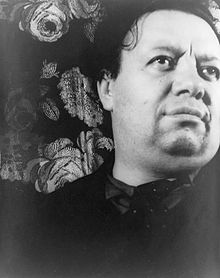Diego Rivera
Mexican muralist
Diego María de la Concepción Juan Nepomuceno Estanislao de la Rivera y Barrientos Acosta y Rodríguez, known as Diego Rivera (December 8, 1886–November 24, 1957) was a Mexican painter.

Quotes
edit- When we began, we had no opportunities; we prepared in silence and created our own opportunity.
- On making your own artistic opportunities in the book Conversations with Diego Rivera: The Monster in His Labyrinth
- Here it is—the might, the power, the energy, the sadness, the glory, the youthfulness of our lands.
- On the layout of New York City (as quoted in the book The Fabulous Life of Diego Rivera)
- Here in Mexico…I find that very simple intuitive persons, in common with a highly sophisticated and prepared type, accept my way of painting. But the bourgeois mind (here as elsewhere called “cultured,” I believe does not. This bourgeois mind of Mexico is that of a special virulence, for being mixed in race for only a few generations, it is also lamentably mixed in its ‘culture.’ It is, in a word, saturated with European bad taste, the finer European influences having been almost wholly rejected by the Creole of Mexico…
- On how his work was received Mexico (as quoted in the book The Fabulous Life of Diego Rivera)
- Your engineers are your great artists and these highways are the most beautiful things I have seen in your beautiful country…Out of them and the machine will issue the style of tomorrow.
- On being enchanted by engineers in “Diego Rivera: A Man and His Murals” (Yale-New Haven Teachers Institute)
Quotes about Diego Rivera
edit- Later on, I learned about the Mexican muralists that painted beautiful images on the walls of public buildings. Diego Rivera, Orozco, Tamayo, and others.
- Adolf Hitler became chancellor of Germany on January 30, 1933, and almost immediately the Left press in the United States began to publish cartoons hostile to his regime. But throughout the decade barely a handful of artists, whatever their political preferences, addressed the increasingly virulent outbreaks of anti-Semitism in Germany. The few who did include the Mexican Diego Rivera (1886-1957), and the Jewish Americans Ben Shahn (1898-1969) and Max Weber (1881-1961). Rivera, one of the first to respond, included an anti-Semitic episode in a mural panel painted toward the end of 1933 in the didactic manner he used at that time. It was the "Hitler" panel, one of twenty-one that comprised his Portrait of America, made for the New Workers' School in New York City. Rivera supported himself while completing the panels with funds he had received for his ill-fated mural for the RCA Building in Rockefeller Center, Man at the Crossroads Looking with Uncertainty but with Hope and High Vision to the Choosing of a Course Leading to a New and Better Future, which was destroyed in 1933 because it included, among other scenes, a portrait of Lenin.
- Matthew Baigell Jewish-American Artists and the Holocaust (1997)